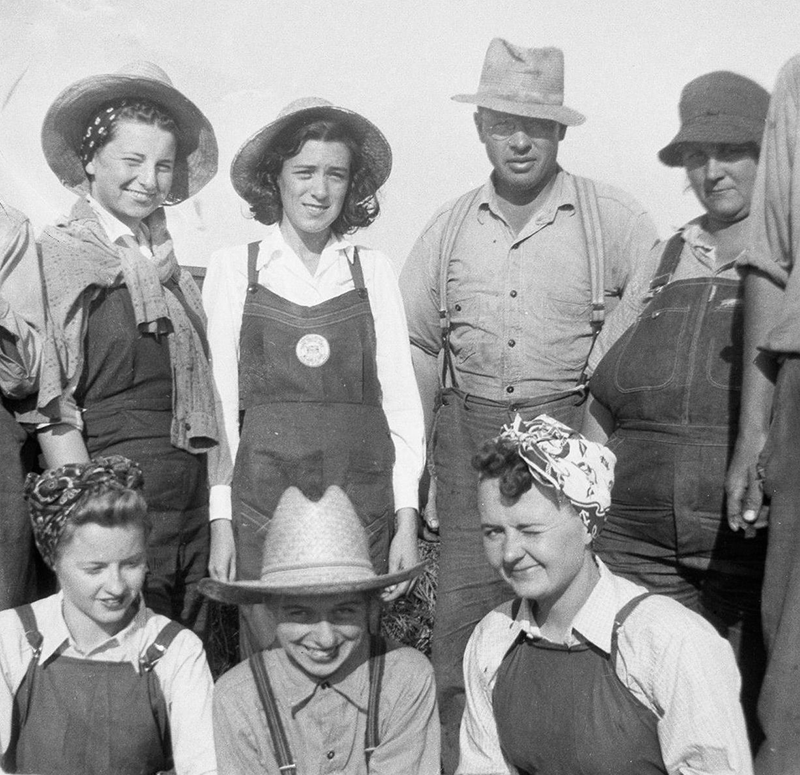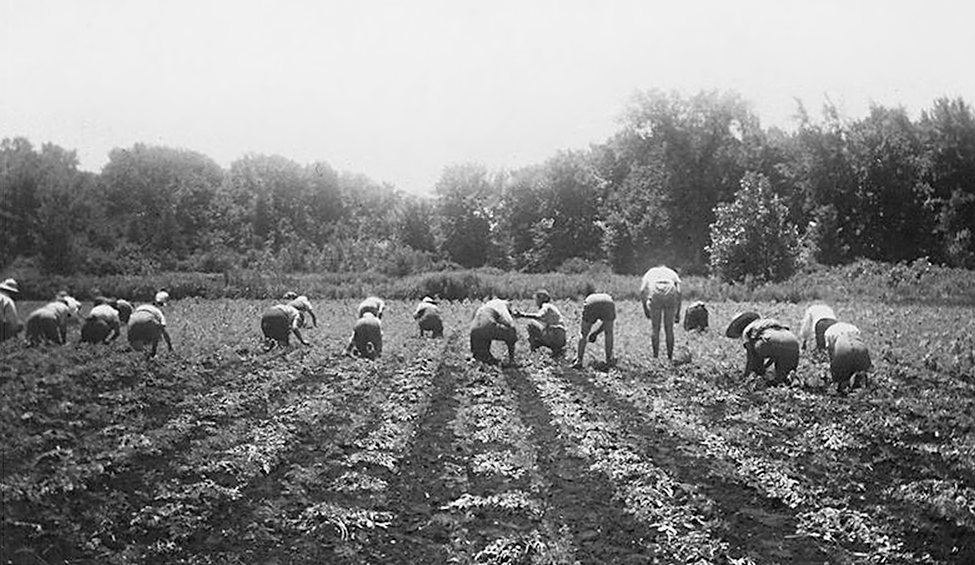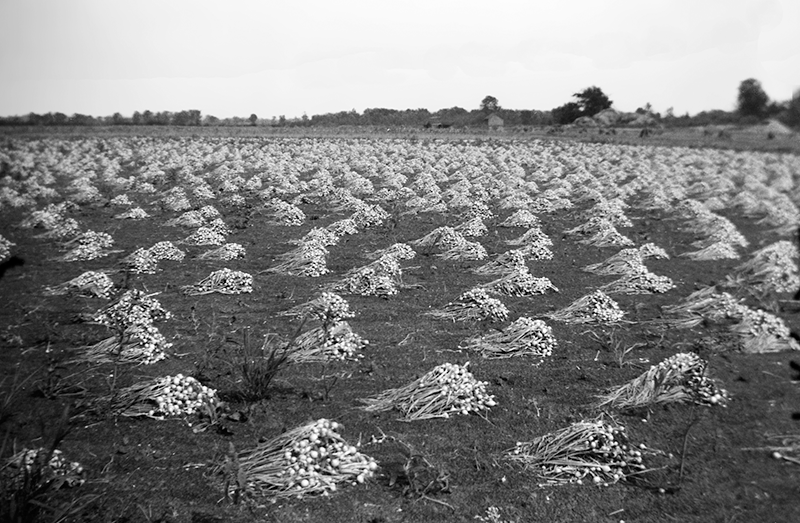Janet (Howes) Hassan and Dorothy (Livermore) Flannagan
1943, Thedford
Janet Howes (top left corner) poses with other farmerettes and farmer Bob Love in Thedford in the 1940s.
The Ontario Farm Service force was sponsored by the Department of Agriculture Toronto, under the Ontario Inter Departmental Committee on Farm Labour and Department of Labour, Ottawa.
Teenage girls were stationed on farms throughout Ontario to replace workers who were either in the Service or employed in essential war industries. They were given the choice of working on their home farm, a cannery or a farm selected by the O.F.S.F.
An incentive for teenage girls in school at the time, was that credit was given for Upper School (grade 13) subjects without writing final exams if you served 6 weeks under this plan. Applicants were required to take the following oath:
“I hereby pledge allegiance to my king, Canada and the British commonwealth of nations. My purpose as a member of the Ontario farm service force is to support our navy, army and air force by assisting in the production of food. I promise to keep myself physically fit and mentally alert and at all times conduct myself in such a manner as to build up and maintain the prestige and honour of the Ontario Farm Service Force.”
Camp Thedford
Oh those glorious days at Camp Thedford in the summer of 1943, when my cousin and I joined the Ontario Farm Service Force. We were two young girls without any farm experience whatsoever, I, Janet Howes Hassan from Harriston and my cousin, Dorothy Livermore Flanagan from Toronto.
First, there was a train ride to London and then a special bus to the sleepy little town of Thedford where we had been assigned to farm work for the summer.
Thedford in those days was a very fertile growing area for crops like onions and celery. We had yet to meet an onion in the flesh, but as the summer wore on we would live them, breathe them and sleep them. Their odour was everywhere.
Happily, we arrived at our destination, which would be home for the next few months. It was an old flax mill, probably dating back to the last century, with the old mill grinding wheels on view and not long vacated by its pigeon residents. The building was still being used when my cousin viewed it on her last nostalgic trip to Thedford in the early '90's. It had been converted into a camp for us mostly helpless girls, many experiencing for the first time being on their own.
The downstairs of the building was a combination of offices for the Camp Mother and the Labour Secretary, a sort of lounge area with pingpong tables, a bit of a library and the eating area, which consisted of painted picnic tables, and a kitchen. Added to this were toilets, showers and a large wash area with big steel tubs that could be used for washing clothes as well as ourselves.
Upstairs was the sleeping area, which consisted of rows of army bunks. Luckily, my cousin and I got a matching set with me I do believe getting the top bunk. Sometimes that wasn't so bad, as the bottoms bunks tended to collect people’s junk, mainly other peoples junk.
Now a word or two about the Camp Mother, who had been hired by the Y.M.C.A. She was a wonderful extrovert, just the sort of person to manage a collection of unruly, high spirited girls with a firm yet kindly hand. Of course there were strict rules with curfews and week end passes and the Camp Mother waiting up each week end for the stragglers to come home. I'm sure there was many a tall tale told at that time!
The Labour Secretary was hired by the Department of Agriculture which had jurisdiction over the camp. The Farmerettes were obliged to pay room and board, which was due when wages were paid, this being $4.50 per week, providing you had worked a full week. Decreasing on a sliding scale after that. I believe we earned 25 cents per hour. Her job was to assign the girls to the different farms. Once a farmer had his required number of workers they usually stayed with him for the season, much to some farmer’s chagrin I'm sure because there were some girls who just goofed off at every chance, but for every one of those, there were mostly girls who worked hard, making the program the success it was.
The whole place was jammed with about 50 girls from various backgrounds, one girl in particular from Toronto, was a talented ballerina. Many the night we were awakened with sobbing and wailing from the homesickness.
My cousin and I were immune to that, having spent our childhood visiting each other either in Toronto or Harriston.
The upper floor of our quarters had a fire escape added on the side of the building, and on those hot summer nights it was pleasant to sit out there until lights out.
Settling in took some organization, due in part to the many items of clothing required and the limited space in which to stash it. Ah! those days before wash and wear clothes, the work shirts, the necessary overalls (with bibs of course) work socks, pajamas, shorts, blouses and that Sunday dress all kept clean by super human effort. We did solve the overall problem though, we just never washed them. After awhile the overalls became quite stiff with concentrated onion juice and were able to stand by themselves, at the end of the bed each night, waiting for their owners to reclaim them in the morning.
Each bed sported a laundry bag hanging in rows like sentinels, mostly bulging with disgustingly filthy things that should have seen soap and water long before.
Other items listed under the equipment on the brochure were: sheets and blankets, bath and hand towels, and pillow cases. These items were requested to be white. Rubber boots, coat hangers, lunch box, thermos bottle laundry, toilet soap, soap dish and drinking cup. Looking back, I wonder how my cousin and I ever managed to take all this stuff. No pillows or mattresses are mentioned, so I'm assuming they did provide those.
Absolutely important was your ration book, which was handed to the Camp Mother on arrival. She had the task of planning and purchasing all the food for the meals and any other expenditure.
Local help in the form of a lady and her daughter did the cooking and the cleaning. Meals were ample and quite delicious, especially Sunday dinner, which always seemed to be chicken. There were some chicken farms in the neighbourhood, so perhaps our quarry came from them.
Lunches taken to the field, were prepared at night before lights out, with each girl taking on the task of making lunches for her farm group. Now this might have seemed like a mighty fine idea, but those girls suffering from procrastination were last at the table and most of the sandwich filling and cookies, fruit etc. were gone. Surprise next day, just pieces of bread and butter, no egg salad, no tuna fish, no peanut butter even, nothing but the slices of bread. Naturally the guilty person got a lot of flack from the rest of her team.
Farmerettes pull onions and then leave them in piles to dry out in the sun.
Our workday began at the crack of dawn, up and make the bed, breakfast already on the table and your boss at the door in some broken down pre-war vehicle that passed for a truck. The favourite seat on the truck was sitting on the fender, legs firmly around the headlight to keep from falling off, so one had to be quick in order to secure one.
The onion fields were flat and rich, possibly an old flood plain or lake bottom. Off to the fields, still damp from the dew then down on all fours for the morning. Each person was assigned three rows of the little green onion devils; you straddled the centre row and weeded all three. At the farm where my cousin and I worked, we were fortunate to have the boss's wife working alongside. Now she was strict and wasn't having these city slickers goofing off. She had an eagle eye and in the early days when the onions were tiny, it was sometimes very hard to bury the ones pulled out by mistake.
Piles of onions that have been harvested dry in the field.
Hopefully by lunch time, if we hadn't succumbed to the heat of the sun, we had time for lunch. We always wore bandanas on our heads to protect the tender part behind the ears from being burnt, as being in the leap frog position or the crawl all day, this part of the body was very vulnerable.
Lunch was eaten on the side of the field, in a shady spot if possible. On a few occasions the FW (farmer's wife) drove back to the farm in her car, leaving us the old truck. On one occasion, my cousin attempted to drive the truck to a shady spot down the road with the rest of the gang. She didn't know that the truck had to be double clutched in order to change gears . With the help
of a local male worker, who wasn't fit for the Military as he suffered from a mental disability but kept shouting out unintelligible instructions, we drove a mile or so to an old well, a lovely place for lunch!
Unfortunately, backing up was tricky and I believe some fencing was rather destroyed in the bargain, however we were never caught and nothing was ever mentioned about the incident.
After the first few days, when we found out our backs really weren't broken, and being on all fours wasn't the end of the world, we actually began to enjoy ourselves!
The town wasn't ready for 50 girls tasting their first bit of freedom, and of course we acted outrageously. We invaded the pool hall, smoked corn cob pipes, wore cotton plaid shirts hanging outside our pants and wore straw hats. I'm sure there was a lot of tut tutting going on.
Our social outings were pretty limited to a picnic at the beach on Sunday. The farmers were a good bunch and kindly gave up their Sundays to drive us to the beach. They had to get special permission to be out with the truck and special gasoline coupons, as gasoline was rationed then, so they took turns, with some of them even inviting their workers to their homes for Sunday dinner.
Occasionally, we attended some event outside the Camp, but always had to have transportation arranged. An army camp, Camp Ipperwash, was fairly close and we did have a few soldier visitors from there come over for a game of pingpong. Pretty dull stuff, no wonder not too many of them braved it. On one occasion we got to attend a dance at the Ipperwash Sergeants Mess.
Mid summer saw the girls tanned beyond all reason, the days before sun tan cream, overalls completely green from the knees down and emitting a dreadful odour all of their own, something between a smashed onion and an unwashed sock.
At the end of the season, the onions had all been harvested and the little green devils had grown into a nice sized pickling onion ready for market. The girls were leaving, promising to be forever friends but in fact, except for one brief reunion that winter, I'm sure we never saw each other again. Fortunately my cousin and I can still conjure up hilarious moments of the glorious summer at Camp Thedford in 1943!
Reprinted with permission from “Adventures of Janet Howes and Dorothy Livermore” by Janet Howes and Dorothy Livermore, A1996.89 Farmerettes: Wellington County Historical Society Essays, 1996, held at the Wellington County Museum and Archives.




 Subscribe to this page
Subscribe to this page